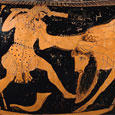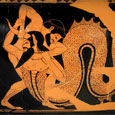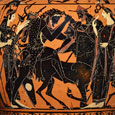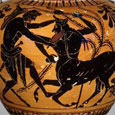AKHELOIOS
Greek Name
Αχελωιος Αχελωος
Transliteration
Akhelôios, Akhelôos
Latin Spelling
Achelous
Translation
River Achelous
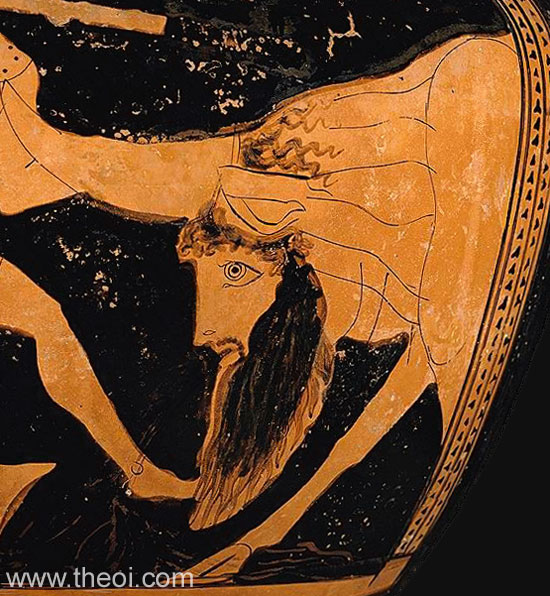
AKHELOIOS (Achelous) was a River-God of Aitolia (Aetolia) in central Greece. As the deity of the largest river in the region he was often portrayed as the god of fresh-water in general.
Akheloios competed with Herakles for the hand of the Aitolian princess Deianeira. During their wrestling match the hero tore off one of the god's horns forming the legendary Cornucopia or Horn of Plenty.
The river-god was depicted in one of four forms. In ancient Greek vase painting he appears as a man-headed bull, a bull-shaped centaur, and a "merman" with a coiling fish-tail in place of a lower torso and legs. In each case his head was crowned with a horn. In mosaic art he was portrayed as a reclining man with an arm resting upon a pitcher of flowing water.
The Akheloios river rises in the Pindar mountain range, flows south through the heart of Aitolia and Akarnania (Acarnania), to empty into the Ionian Sea near the mouth of the Gulf of Korinthos (Corinth). The most significant neighbouring river is the Euenos (Evenus) to the east.
FAMILY OF ACHELOUS
PARENTS
[1.1] OKEANOS & TETHYS
(Theogony 337; Hyginus Pref)
[1.2] OKEANOS & GAIA (Greek Lyric I Alcaeus Frag 450)
OFFSPRING
[1.1] THE SEIRENES (by Melpomene) (Apollodorus 1.18, 1.63,
Lycophron 712, Hyginus Fabulae 141)
[1.2] THE SEIRENES (by Sterope) (Apollodorus
1.63)
[1.3] THE SEIRENES (by Terpsikhore) (Argonautica 4.892,
Dionysiaca 13.313)
[1.4] THE SEIRENES (Pausanias 9.34.3,
Metamorphoses 14.85)
[2.1] KALLIRHOE (Apollodorus 3.88,
Pausanias 8.24.9)
[3.1] HIPPODAMOS, ORESTES (by Perimede) (Apollodorus 1.52)
[4.1] KASTALIA (Panyassis Frag, Pausanias
10.8.9)
[5.1] PEIRENE (Pausanias 2.2.2)
[6.1] THE AKHELOIDES (Metamorphoses
8.547)
ENCYCLOPEDIA
ACHELO′US (Achelôios), the god of the river Achelous which was the greatest, and according to tradition, the most ancient among the rivers of Greece. He with 3000 brother-rivers is described as a son of Oceanus and Thetys (Hes. Theog. 340), or of Oceanus and Gaea, or lastly of Helios and Gaea. (Natal. Com. vii. 2.) The origin of the river Achelous is thus described by Servius (ad Virg. Georg. i. 9; Aen. viii. 300): When Achelous on one occasion had lost his daughters, the Sirens, and in his grief invoked his mother Gaea, she received him to her bosom, and on the spot where she received him, she caused the river bearing his name to gush forth. Other accounts about the origin of the river and its name are given by Stephanus of Byzantium, Strabo (x. p. 450), and Plutarch. (De Flum. 22.) Achelous the god was a competitor with Heracles in the suit for Deïaneira, and fought with him for the bride. Achelous was conquered in the contest, but as he possessed the power of assuming various forms, he metamorphosed himself first into a serpent and then into a bull. But in this form too he was conquered by Heracles, and deprived of one of his horns, which however he recovered by giving up the horn of Amalthea. (Ov. Met. ix. 8, &c.; Apollod. i. 8. § 1, ii. 7. § 5.) Sophocles (Trachin. 9, &c.) makes Deïaneira relate these occurrences in a somewhat different manner. According to Ovid (Met. ix. 87), the Naiads changed the horn which Heracles took from Achelous into the horn of plenty. When Theseus returned home from the Calydonian chase he was invited and hospitably received by Achelous, who related to him in what manner he had created the islands called Echinades. (Ov. Met. viii. 547, &c.) The numerous wives and descendants of Achelous are spoken of in separate articles. Strabo (x. p. 458) proposes a very ingenious interpretation of the legends about Achelous, all of which according to him arose from the nature of the river itself. It resembled a bull's voice in the noise of the water; its windings and its reaches gave rise to the story about his forming himself into a serpent and about his horns; the formation of islands at the mouth of the river requires no explanation. His conquest by Heracles lastly refers to the embankments by which Heracles confined the river to its bed and thus gained large tracts of land for cultivation, which are expressed by the horn of plenty. (Compare Voss, Mytholog. Briefe, lxxii.) Others derive the legends about Achelous from Egypt, and describe him as a second Nilus. But however this may be, he was from the earliest times considered to be a great divinity throughout Greece (Hom. Il. xxi. 194), and was invoked in prayers, sacrifices, on taking oaths, &c. (Ephorus ap. Macrob. v. 18), and the Dodonean Zeus usually added to each oracle he gave, the command to offer sacrifices to Achelous. (Ephorus, l. c.) This wide extent of the worship of Achelous also accounts for his being regarded as the representative of sweet water in general, that is, as the source of all nourishment. (Virg. Georg. i. 9, with the note of Voss.) The contest of Achelous with Heracles was represented on the throne of Amyclae (Paus. iii. 18. § 9), and in the treasury of the Megarians at Olympia there was a statue of him made by Dontas of cedar-wood and gold. (Paus. vi. 19. § 9.) On several coins of Acarnania the god is represented as a bull with the head of an old man. (Comp. Philostr. Imag. n. 4.)
Source: Dictionary of Greek and Roman Biography and Mythology.
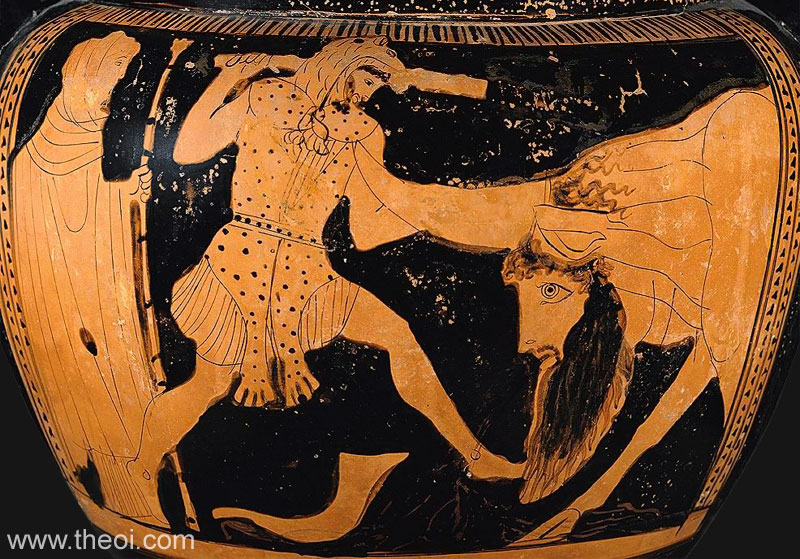
CLASSICAL LITERATURE QUOTES
PARENTAGE OF ACHELOUS
Hesiod, Theogony 337 ff (trans. Evelyn-White) (Greek epic C8th or 7th B.C.)
:
"Tethys bore to Okeanos (Oceanus) the swirling Potamoi (Rivers) . . . silver-swirling Akheloios (Achelous),
Nessos and Rhodios [in a long list of rivers]."
Alcaeus, Fragment 450 (from Comes Natalis, Mythology) (trans. Campbell, Vol. Greek
Lyric I) (C7th to 6th B.C.) :
"Alkaios (Alcaeus) said that Akheloios (Achelous) was the son of Okeanos (Oceanus) and Ge (Gaea,
Earth)."
Pseudo-Hyginus, Preface (trans. Grant) (Roman mythographer C2nd A.D.) :
"From Oceanus and Tethys [were born] the Oceanides . . . Of the same descent Rivers : Strymon, Nile,
Euphrates, Tanais, Indus, Cephisus, Ismenus, Axenus, Achelous, Simoeis, Inachus, Alpheus, Thermodon, Scamandrus,
Tigris, Maeandrus, Orontes."
ACHELOUS FATHER OF THE SIRENS
Pseudo-Apollodorus, Bibliotheca 1. 18 (trans. Aldrich) (Greek mythographer C2nd A.D.)
:
"[The Mousa (Muse)] Melpomene bore to Akheloios (Achelous) the Seirenes (Sirens), whom we shall discuss in
the course of the tale of Odysseus."
Pseudo-Apollodorus, Bibliotheca 1. 63 :
"They [king Porthaon and Euryte of Aitolia (Aetolia)] also had a daughter Sterope, who was alleged to be
the mother by Akheloios (Achelous) of the Seirenes (Sirens)."
Apollonius Rhodius, Argonautica 4. 892 ff (trans. Rieu) (Greek epic C3rd B.C.)
:
"The clear-voiced Seirenes (Sirens), Akheloos' (Achelous') daughters, used to bewitch with their seductive
melodies whatever sailors anchored there. Lovely Terpsikhore (Terpsichore), one of the Mousai (Muses), has borne
them to Akheloos, and at one time they had been handmaids to Demeter's gallant daughter [Persephone], before she
was married, and sung to her in chorus."
Lycophron, Alexandra 712 ff (trans. Mair) (Greek poet C3rd B.C.) :
"The triple daughters [the Seirenes (Sirens)] of Tethys' son [Akheloios (Achelous)], who imitated the
strains of their melodious mother [Melpomene]."
Pseudo-Hyginus, Preface (trans. Grant) (Roman mythographer C2nd A.D.) :
"From Acheloos and Melpomene [were born] : Sirenes (Sirens) [named] Thelxiepe, Molpe and Pisinoe."
Nonnus, Dionysiaca 13. 313 ff (trans. Rouse) (Greek epic C5th A.D.) :
"Lake Katana (Catana) [in Sicily] near the Seirenes (Sirens), whom rosy Terpsikhore (Terpsichore) brought
forth by the stormy embraces of her bull-horned husband Akheloos (Achelous)."
OTHER CHILDREN OF ACHELOUS
Akheloios was the largest river emptying into the Gulf of Korinthos (Corinth). Naiad-nymphs of springs along the coast of the Gulf, such as Kastalia (Castalia) at Delphoi, and Peirene in Korinthos (Corinth), were described as daughters of the River and were believed to draw their waters from his stream.
Pseudo-Apollodorus, Bibliotheca 1. 52 (trans. Aldrich) (Greek mythographer C2nd A.D.)
:
"Now Perimede [daughter of Aiolos (Aeolus)] bore sons Hippodamas and Orestes to Akheloios (Achelous)."
Pausanias, Description of Greece 2. 2. 2 (trans. Jones) (Greek travelogue C2nd A.D.)
:
"Lekhes (Leches) and Kenkhrias (Cenchrias) [eponyms of the twin ports of Korinthos (Corinth)], said to be
children of Poseidon and Peirene the daughter of Akheloios (Achelous)."
Pausanias, Description of Greece 10. 8. 9 ) :
"You reach, on the right of the way [to the sanctuary of Delphoi (Delphi), Phokis] the water of Kastalia
(Castalia), which is sweet to drink and pleasant to bathe in . . . Panyassis [epic poet C5th B.C.] who composed
an epic poem on Herakles, says that Kastalia was a daughter of Akheloios (Achelous). For about Herakles he says
:--‘Crossing with swift feet snowy Parnassos he reached the immortal water of Kastalia, daughter of
Akheloios.’"
ACHELOUS PRINCE OF RIVERS & GOD OF WATER
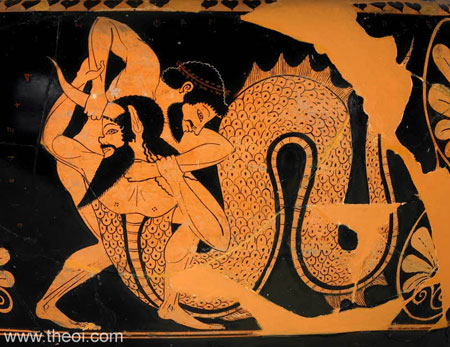
Akheloios was the god of the largest river of ancient Greece and as such he was titled Prince of Rivers and worshipped in the lands bordering the Gulf of Korinthos (Corinth) as the god of fresh-water.
Homer, Iliad 21. 192 ff (trans. Lattimore) (Greek epic C8th B.C.) :
"Here is a great River beside you, if he were able to help; but it is not possible to fight Zeus, son of
Kronos (Cronus). Not powerful Akheloios (Achelous) matches his strength against Zeus, not the enormous strength
of Okeanos (Oceanus) with his deep-running waters, Okeanos, from whom all rivers are and the entire sea and all
springs and all deep wells have their waters of him."
Pausanias, Description of Greece 8. 38. 10 (trans. Jones) (Greek travelogue C2nd
A.D.) :
"[Akheloos (Achelous)] is said by Homer in the Iliad to be the prince of all rivers."
Ovid, Metamorphoses 8. 547 ff (trans. Melville) (Roman epic C1st B.C. to C1st A.D.)
:
"Theseus was on his way to Pallas' citadel [i.e. Athens] . . . but his road was cut and progress halted by
the swollen stream of Achelous. ‘Enter my abode, illustrious prince of Athens,’ said the River;
‘Risk not my ravening torrent. It transports so often massive trees and sweeps away huge boulders headlong
with a mighty roar. Tall stables standing by the banks I've seen borne down, their cattle with them. In that
flood no strength could save the ox, nor speed the horse. And when the mountains free their snows, this spate
drowns many a strong man in its swirling waves. Rest will be safer, till the stream resumes its usual bounds,
till its own bed contains a slender flow.’
And Aegeus' son agreed; ‘Your counsel,’ he replies, ‘and your kind home, both I'll
accept,’ and he accepted both.
Of porous pumice and rough tufa-rock the residence was built. The floor was damp and soft with moss, the ceiling
diapered with shells of conch and murex laid in turn. And now the sun had measured two long thirds of daylight.
Theseus with his company reclined on couches, here Ixion's son [Peirithoos], there Lelex, Troezen's hero,
greying hair already on his temples; others too whom the Arcanian River-God had deemed deserving of like honour,
overjoyed himself to entertain so great a guest. Soon bare foot River-Nymphs arranged the tables and spread the
banquet-board, and when the feast was cleared they set a jewelled bowl of wine.
[Akheloios (Achelous) then tells Theseus the tale of the metamorphosis of the Ekhidnades into islands, of his
love for the girl Perimele and his contest with Herakles for Deianeira. See the following sections.]"
Virgil, Georgics 1. 8 ff (trans. Fairclough) (Roman bucolic C1st B.C.) :
"[Dionysos] blended draughts of Achelous [i.e. fresh water] with the newfound grapes."
See also Cult of Achelous (worshipped as the god of fresh water)
ACHELOUS, ALCMAEON & CALLIRHOE
Pseudo-Apollodorus, Bibliotheca 3. 88 (trans. Aldrich) (Greek mythographer C2nd A.D.)
:
"The oracular god [Apollon] told him [Alkmaion (Alcmaeon)] to go to Akheloios (Achelous) and receive a
second purification from him [i.e. for the murder of his mother Eriphyle] . . . Finally he made his was to the
springs of Akheloios, was purified by him and given his daughter Kallirrhoe (Callirhoe). He also colonized
Akheloios' alluvial land and settled there."
Pausanias, Description of Greece 8. 24. 9 (trans. Jones) (Greek travelogue C2nd A.D.)
:
"On discovering the alluvial deposit of the Akheloios (Achelous) [in Akarnania] he [Alkmaion (Alcmaeon)]
settled there, and took to wife Kallirhoe (Callirhoe), said by the Akarnanians to have been the daughter of
Akheloios."
Ovid, Fasti 2. 43 ff (trans.Boyle) (Roman poetry C1st B.C. to C1st A.D.) :
"Amphiareides [i.e. Alkmaion (Alcmaeon) son of Amphiaraus] told Naupactian Achelous ‘Absolve my
sin’; and he absolved his sin. Ah! simpletons, to think dismal crimes of murder can be washed away by
river water."
CONTEST OF ACHELOUS & HERACLES FOR DEIANEIRA
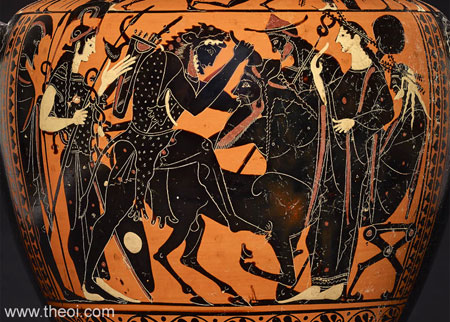
Pseudo-Apollodorus, Bibliotheca 1. 64 (trans. Aldrich) (Greek mythographer C2nd A.D.)
:
"This girl [Deianeira] plied the chariot reins and was adept in military exercises. It was over her that
Herakles wrestled with Akheloios (Achelous)."
Pseudo-Apollodorus, Bibliotheca 2. 148 :
"In Kalydon (Calydon) Herakles courted Deianeira, the daughter of Oeneus, and for her hand in marriage
wrestled with Akheloios (Achelous). Akheloios took the form of a bull, but Herakles knocked off one of his
horns. He then married Deianeira. Akheloios retrieved his horn by trading Herakles the horn of Amaltheia for it.
Amaltheia, a daughter of Haimonios (Haemonius), had the horn of a bull, which, according to Pherekydes
(Pherecydes), could provide bounteous amounts of food or drink, whichever one wished for."
Diodorus Siculus, Library of History 4. 35. 3 (trans. Oldfather) (Greek historian
C1st B.C.) :
"[A rationalisation of the myth :] Herakles, desiring to do a service to the Kalydonians (Calydonians),
diverted the river Akheloos (Achelous), and making another bed for it he recovered a large amount of fruitful
land which was irrigated by this stream.
Consequently certain poets, as we are told, have made this deed into a myth; for they have introduced Herakles
as joining battle with Akheloos, the river assuming the form of a bull, and as breaking off in the struggle one
of his horns, which he gave to the Aitolians (Aetolians). This they call the ‘Horn of Amaltheia,’
and represent it as filled with a great quantity of every kind of autumn fruit such as grapes and apples and the
like, the poets signifying in this obscure manner by the horn of Akheloos the stream which ran through the
canal, and by the apples and pomegranates and grapes the fruitful land which was watered by the river and the
multitude of its fruit-bearing plants."
Strabo, Geography 10. 2. 19 (trans. Jones) (Greek geographer C1st B.C. to C1st A.D.)
:
"It was this silt [from the river Akheloos (Achelous)] which in early times caused the country called
Parakheloïtis, which the river overflows, to be a subject of dispute, since it was always confusing the
designated boundaries between the Akarnanians (Acarnanians) and the Aitolians (Aetolians); for they would decide
the dispute by arms, since they had no arbitrators, and the more powerful of the two would win the victory; and
this is the cause of the fabrication of a certain myth, telling how Herakles defeated Akheloos and, as the prize
of his victory, won the hand of Deïaneira, the daughter of Oineus (Oeneus), whom Sophokles (Sophocles)
represents as speaking as follows : ‘For my suitor was a River-god, I mean Akheloüs, who would demand
me of my father in three shapes, coming now as a bull in bodily form, now as a gleaming serpent in coils, now
with trunk of man and front of ox.’
Some writers add to the myth, saying that this was the horn of Amaltheia, which Herakles broke off from Akheloos
and gave to Oineus as a wedding gift. Others, conjecturing the truth from the myths, say that the Akheloos, like
the other rivers, was called ‘like a bull’ from the roaring of its waters, and also from the the
bendings of its streams, which were called Horns, and ‘like a serpent’ because of its length and
windings, and ‘with front of ox’ for the same reason that he was called ‘bull-faced’;
and that Herakles, who in general was inclined to deeds of kindness, but especially for Oineus, since he was to
ally himself with him by marriage, regulated the irregular flow of the river by means of embankments and
channels, and thus rendered a considerable part of Parakheloïtis dry, all to please Oineus; and that this
was the horn of Amaltheia."
Pausanias, Description of Greece 3. 18. 16 (trans. Jones) (Greek travelogue C2nd
A.D.) :
"[Amongst the scenes depicted on the throne of Apollon at Amyklai (Amyclae) near Sparta :] There are also
represented the wrestling of Herakles with Akheloos (Achelous)."
Pausanias, Description of Greece 6. 19. 12 :
"[Dedicated at Olympia :] Small cedar-wood images inlaid with gold, representing the fight of Herakles with
Akheloos (Achelous). The figures include Zeus, Deianeira, Akheloos, Herakles, and Ares helping Akheloos. There
one stood here an image of Athene, as being an ally of Herakles."
Philostratus the Younger, Imagines 4 (trans. Fairbanks) (Greek rhetorician C3rd A.D.)
:
"[Ostensibly a description of an ancient Greek painting at Neapolis (Naples) :] Herakles or Akheloios
(Achelous) : Probably you are asking what these three figures have to do with each other--a serpent ‘ruddy
of back’ which rises there lifting its long form, a bead hanging beneath an erect serrated crest, its
glare terrible and its glance one that cannot but work consternation; a bull that curves its neck beneath those
mighty horns and, pawing the earth at its feet, rushes as for a charge; and here a man that is half animal, for
he has the forehead of a bull and a spreading beard, while streams of water run in floods from his chin. The
multitude that has gathered as for a spectacle; the girl in their midst, a bride, I suppose (for this must be
inferred from the ornaments she wears); an old man yonder of sad countenance; a youth who is divesting himself
of a lion's skin and holding in his hands a club; and here a heroine of sturdy form who has been crowned with
beech leaves in harmony with the story of her Arkadian nurture--all this, I think, is Kalydon (Calydon).
What is the meaning of the painting? The river Akheloios (Achelous), my boy, in love with Deianeira the daughter
of Oineos (Oeneus), presses for the marriage; and Peitho (Persuasion) has no part in what he does, but by
assuming now one and now another of the shapes we see here, he thinks to frighten Oineos. For you are to
recognize the figure in the painting as Oineos, despondent on account of his daughter Deianeira, who looks so
dolefully at her suitor. For she is painted, not with cheek reddening through modesty, but as greatly terrified
at the thought of what she will suffer in union with that unnatural husband. But the noble Heracles willingly
assumes the task as an ‘incident of his journey,’ to use a popular phrase.
So much by way of prelude; but now see how the contestants have already joined battle, and you must imagine for
yourself all that has transpired in the first bouts of the struggle between god and irresistible hero. Finally,
however, the river, assuming the form of a horned bull, rushes at Herakles, but he, grasping the right horn with
his left hand, uproots the other horn from its forehead with the aid of his club; thereupon the river-god, now
emitting streams of blood instead of water, gives up the struggle, while Herakles, full of joy at his deed,
looks at Deianeira, and throwing his club on the ground holds out to her the horn of Akheloios as his nuptial
gift."
Pseudo-Hyginus, Fabulae 31 (trans. Grant) (Roman mythographer C2nd A.D.) :
"The River Achelous used to change himself into all sorts of shapes. When he fought with Hercules to win
Dejanira in marriage, he changed himself into a bull. Hercules tore off his horn, presenting it to the
Hesperides or the Nymphae (Nymphs), and the goddesses filed it with fruits and called it Cornucopia."
Ovid, Metamorphoses 8. 725 & 879 ff (trans. Melville) (Roman epic C1st B.C. to
C1st A.D.) :
"More marvels of the gods he [Theseus] wished to hear, and thereupon the River of Calydon (Amnis
Calydonius) [Akheloios (Achelous)], propped on his elbow, turned to him and said : ‘[He tells
Theseus the tale of Erysikhthon and his shape-shifting daughter.] . . . But why spend time on tales of others? I
myself, young friends, also possess the power of changing, though my choice is limited. At times you see me as I
am; at times I twist into a snake; at times a bull that leads the herd, my strength set in my horns.
Horns!--while I could!--but now one side, you see, has lost its weapon.’
And he gave a groan. Why the god groaned and how his brow was maimed Neptunius [Theseus son of Poseidon]
enquired, and great River of Calydon (Amnis Calydonius), his tangled tresses bound with reeds, began :
‘Sad is the task you set. For who would wish to chronicle the battles that he lost? Yet the whole tale
I'll tell. It was less shame to lose than glory to have fought the fight: much comfort comes from such a
conqueror. You may perhaps have heard of Deianira, once a most lovely girl, the envied hope of many a suitor. I
was one of them and entered the king's palace hopefully and "Sire, son of Parthaon [i.e. Oeneus]," I
said, "I crave your daughter's hand." So, too, said Alcides [Heracles]. The others all gave way to us,
us two. He told his tale how Jove [Zeus] would be her father-in-law, the fame of his great labours, the
accomplishment of Juno's [Hera's] orders. I, opposing, said, "Disgrace it is if gods give way to men."
(He was not yet a god.) "In me you see the master of the waters that descend in winding courses through
your royal realm; no stranger son-in-law from foreign shores, but one of your own folk, your own affairs. Let it
not damage me that royal Juno [Hera] does not detest me, that no toils imposed have ever punished me! You,
Alcmena's son [Heracles], who claim your father's Juppiter--that tale's untrue, or true to your disgrace: a
father through your mother's sin. So choose which you prefer, either that fatherhood is false or you were born
in infamy." While I was speaking, all the time, he scowled, and, failing to control his flaring rage, gave
me his curt reply : "This hand of mine is better than my tongue. Win, if you may, with words, provided I
prevail in deeds!"
‘And on he rushed in fury. My fine words made me ashamed to flinch. I threw aside my green cloak, raised
my arms and poised my hands half-curled before my chest and stood to fight. He scooped up dust and threw it over
me, and he was yellowed too with my golden sand. Now at my neck, now at my twinkling legs he lunged (or
feinted), pressing his attack at every point. My weight protected me; I stood unscathed, like a huge rock that
waves beat with a roaring crash, and there it stands fast in the safety of its mighty mass. We drew apart a
little, then again joined battle, standing rooted, both resolved never to yield an inch. Foot locked with foot,
fingers with fingers, brow to brow, I pressed him down half-prone; as I've seen battling bulls collide in
contest for the sleekest cow of all the countryside; the herd looks on in fear and awe not knowing which of them
the victory and the sovereignty await. Three times with no success did Alcides [Heracles] struggle and strain to
break my lock; the fourth shook off my hold and loosed my clinching arms, and, striking with his fist (I mean to
tell the truth) he whirled me round and clung with all his weight upon my back If you'd believe (I seek no fame
from fiction), crushing me I seemed to have a mountain. Even so I managed to insert my sweating arms, I managed
to dislodge his iron grip. He charged as I stood breathless, gave me no chance to recover, and got me round my
neck. At last, forced to my knees, I bit the sand. Outmatched, out'man'ned, I used that art of mine : changed to
a long smooth snake I slid from him. In circling sinuous coils I wound myself and flickering my forked tongue
hissed horribly. Tirynthius [Heracles] laughed and mocked my magic. "Mastering Dracones (Dragon-Serpents)
is child's play, Achelous! Yes, if you were champion serpent, how could you compare with Echidna Lernaea [i.e.
the Hydra], you a single snake? It throve on wounds: of all its hundred heads I cut off one but from its neck
two more sprang to succeed it, stronger than before! Yes, though it branched with serpents sprung from death,
and multiplied on doom, I mastered it, and, mastered, I dispatched it. What's in store for you, d'you think, no
proper snake at all, no weapons of your own, just skulking in a shape you've begged and borrowed?"
‘As he spoke, he locked his fingers round my neck; I felt my windpipe in a vice; in agony I fought to free
my gullet from his thumbs. Vanquished again, my third shape still remained, a savage bull. A bull! And I fought
back! On my left side he threw his arms around my bulging neck and, as I raced along, kept pace and dragged me
down and forced my horns right into the hard ground and laid me low in the deep sand. Even that was not enough :
he grasped my strong stiff horn in his fierce hand, broke it, and wrenched it off--my brow was maimed! My Naides
(Naiads) filled it full of fragrant flowers and fruits, and hallowed it. From my honour now Bona Copia (Good
Plenty) finds her wealth and riches flow.’
His tale was done. One of the serving Nympha, dressed in Diana's [Artemis'] simple style, her hair flowing on
either side, came bearing in the horn with all its wealth, all autumn there, fruits in perfection for our second
course. Dawn came, and, when the sun's first rising beams struck on the peaks, the young men went their way, not
waiting till the Flumina (River) had regained its peace and placid flow and all the flood had fallen. Achelous
hid his face, his rustic face, and head with missing horn beneath his waters. Humbled though he was to lose that
elegance, all else was sound, and he concealed his loss with willow leaves or reeds and rushes worn upon his
head."
Ovid, Heroides 9. 137 ff (trans. Showerman) (Roman poetry C1st B.C. to C1st A.D.)
:
"[Deianeira writes a letter to Heracles :] Twice you have fought for the sake of men. In tears Achelous
gathered up his horns on the wet banks of his stream, and bathed in its clayey tide his mutilated brow; [and]
the half-man Nessus sank down in lotus-bearing Euenus."
Ovid, Heroides 16. 263 ff :
"Ah, might the gods make you the prize in a mighty contest, and let the victor have you for his couch! . .
. as fierce Hercules broke the horns of Achelous while aspiring to thy embraces, Deianira."
Propertius, Elegies 2. 34 (trans. Goold) (Roman elegy C1st B.C.) :
"The course of Aetolian Achelous, its waters flowed shattered by the power of love."
Statius, Thebaid 4. 106 ff (trans. Mozley) (Roman epic C1st A.D.) :
"The River [Akheloos (Achelous)] whose face the athlete Hercules did mar : even yet scarce dares he raise
his stricken visage from the water's depth, but mourns with head sunk far below in his green cave, while the
river-banks pant and sicken with dust."
Nonnus, Dionysiaca 17. 238 ff (trans. Rouse) (Greek epic C5th A.D.) :
"They sing of horned Akheloos (Achelous), when Herakles cut off his horn and took it to adorn his
wedding."
Nonnus, Dionysiaca 43. 12 ff :
"Deianeira, who once in that noisy strife for a bride preferred Herakles, and stood there fearing the
wedding with a fickle bullhorn Potamos (River)."
ACHELOUS & THE ECHIDNADES ISLANDS
Ovid, Metamorphoses 8. 577 ff (trans. Melville) (Roman epic C1st B.C. to C1st A.D.)
:
"Theseus [a guest of Akheloios (Achelous)], gazing out to sea, pointed and asked ‘What place is that?
And tell me what is that islands name, although it seems not one but more?’
The River [Akheloios] answered ‘No, what you observe is not one island. Five lie there, but distance blurs
their difference. What great Diana [Artemis] did when she was scorned need not surprise you. These five islands
once were Nymphae (Nymphs). Ten bullocks they had sacrificed and called the rustic gods to share the rite with
festal dance, but me they forgot. I swelled in anger, high as when my flood flows at its highest, merciless
alike in rage and waters. Fields I tore from fields, forests from forests, and the Nymphae, at last mindful of
me, with the ground beneath their feet I rolled right out to sea. The ocean's surge and mine broke up that spit
of land to form the five Echinades whose number now you mark amid the waves.’"
LOVE OF ACHELOUS & PERIMELE
Ovid, Metamorphoses 8. 577 ff (trans. Melville) (Roman epic C1st B.C. to C1st A.D.)
:
"[Akheloios (Achelous) tells the tale of his love for Perimele :] ‘As you see, there lies one island
in the distance [i.e. one of the Ekhidnades (Echidnades) at the mouth of the river Akheloios], look, there in
the distance, one that's dear to me, named Perimele by the mariners. She was my loved one and to me she lost her
maidenhead. Hippodamas, her father, in outrage hurled his daughter to her doom from a high cliff. I caught her;
as she swam I held her up and prayed, "O thou whose lot won the world's second share, the wandering waves,
God of the Trident, thou to whom at last all we pure holy river make our way, Neptunus [Poseidon], be present
now and hear my prayer. Her whom I hold, I wronged. Hippodamas, if he were fair, if he were fatherlike, if he
were less unloving, less a brute, he ought to pity her and pardon me. Since from the land her father's savagery
has sundered her, grant her to have a place, or be herself a place, that I'll embrace!"
‘The ruler of the ocean gave assent and every wave was shaken by his nod. The Nympha was terrified, but
still she swam, and as she swam I touched her trembling breasts, quivering in fear and, as I fondled her, her
body all grew hard beneath my hand and she lay buried by the rising land.’
The River finished and fell silent. All were moved and marvelled at the miracle."
CULT OF THE RIVER-GOD ACHELOUS
Akheloios was an Aitolian river whose stream flowed into the sea at the throat of the Gulf of Korinthos (Corinth). As the largest river in southern Greece he was worshipped throughout the region as the god of fresh-water springs.
I. Near ATHENS Chief City of Attica (Southern Greece)
Plato, Phaedrus (Greek philosopher C4th B.C.) :
"Here, a fair resting-place, full of summer sounds and scents. Here is this lofty and spreading plane-tree
[on the banks of the Ilissos river in Attika], and the agnus cast us high and clustering, in the fullest blossom
and the greatest fragrance; and the stream which flows beneath the plane-tree is deliciously cold to the feet.
Judging from the ornaments and images, this must be a spot sacred to Akheloios (Achelous) and the Nymphai
(Nymphs). How delightful is the breeze :--so very sweet; and there is a sound in the air shrill and summerlike
which makes answer to the chorus of the cicadae. But the greatest charm of all is the grass, like a pillow
gently sloping to the head."
II. OROPUS (OROPOS) Village in Attica (Southern Greece)
Pausanias, Description of Greece 1. 34. 3 (trans. Jones) (Greek travelogue C2nd A.D.)
:
"[In the sanctuary of Amphiaraus in Oropos, Attika :] The altar shows parts . . . the third is to Hestia
and Hermes and [the hero] Amphiaraus and the children of Amphilokhos (Amphilochus) . . . The fifth is dedicated
to the Nymphai (Nymphs) and Pan, and to the rivers Akheloos (Achelous) and Kephisos (Cephisus)."
III. Near THESPEIA Town in Boeotia (Southern Greece)
Philostratus the Elder, Imagines 1. 23 (trans. Fairbanks) (Greek rhetorician C3rd
A.D.) :
"A youth [Narkissos (Narcissus)] just returned from the hunt stands over a pool . . . The cave is sacred to
Akheloos (Achelous) and the Nymphai (Nymphs), and the scene is painted realistically. For the statues are of a
crude art and made from a local stone; some of them are worn away by time, others have been mutilated by
children of cowherds or shepherds while still young and unaware of the presence of the god [i.e.
Dionysos]."
[N.B. The pool of Narkissos was located at place called Donakon (Donacon) near Thespeia (cf. Pausanias 9.31.7).]
ANCIENT GREEK ART
SOURCES
GREEK
- Homer, The Iliad - Greek Epic C8th B.C.
- Hesiod, Theogony - Greek Epic C8th - 7th B.C.
- Greek Lyric I Alcaeus, Fragments - Greek Lyric C6th B.C.
- Plato, Phaedrus - Greek Philosophy C4th B.C.
- Apollodorus, The Library - Greek Mythography C2nd A.D.
- Apollonius Rhodius, The Argonautica - Greek Epic C3rd B.C.
- Lycophron, Alexandra - Greek Poetry C3rd B.C.
- Diodorus Siculus, The Library of History - Greek History C1st B.C.
- Strabo, Geography - Greek Geography C1st B.C. - C1st A.D.
- Pausanias, Description of Greece - Greek Travelogue C2nd A.D.
- Philostratus the Elder, Imagines - Greek Rhetoric C3rd A.D.
- Philostratus the Younger, Imagines - Greek Rhetoric C3rd A.D.
- Nonnus, Dionysiaca - Greek Epic C5th A.D.
ROMAN
- Hyginus, Fabulae - Latin Mythography C2nd A.D.
- Ovid, Metamorphoses - Latin Epic C1st B.C. - C1st A.D.
- Ovid, Fasti - Latin Poetry C1st B.C. - C1st A.D.
- Ovid, Heroides - Latin Poetry C1st B.C. - C1st A.D.
- Virgil, Georgics - Latin Bucolic C1st B.C.
- Propertius, Elegies - Latin Elegy C1st B.C.
- Statius, Thebaid - Latin Epic C1st A.D.
BIBLIOGRAPHY
A complete bibliography of the translations quoted on this page.
